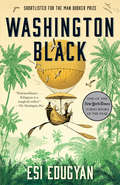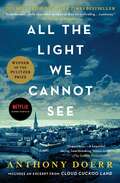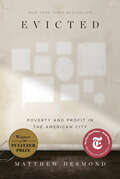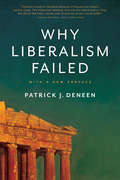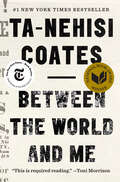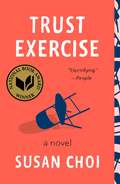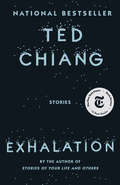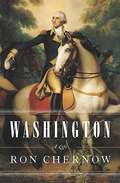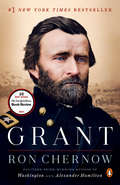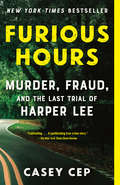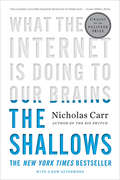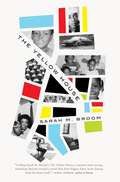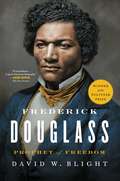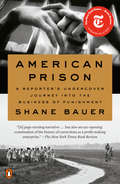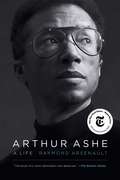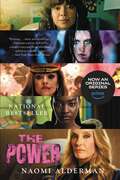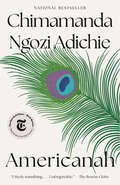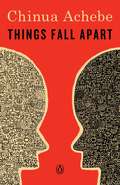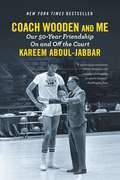Special Collections
Obama's Recommended Reads
- Table View
- List View
Washington Black
by Esi EdugyanLONGLISTED FOR THE MAN BOOKER PRIZE 2018 |
From the author of the award-winning international best seller Half-Blood Blues comes a dazzling new novel, about a boy who rises from the ashes of slavery to become a free man of the world.
George Washington Black, or "Wash," an eleven-year-old field slave on a Barbados sugar plantation, is terrified to be chosen by his master's brother as his manservant. To his surprise, the eccentric Christopher Wilde turns out to be a naturalist, explorer, inventor, and abolitionist.
Soon Wash is initiated into a world where a flying machine can carry a man across the sky, where even a boy born in chains may embrace a life of dignity and meaning--and where two people, separated by an impossible divide, can begin to see each other as human.
But when a man is killed and a bounty is placed on Wash's head, Christopher and Wash must abandon everything. What follows is their flight along the eastern coast of America, and, finally, to a remote outpost in the Arctic. What brings Christopher and Wash together will tear them apart, propelling Wash even further across the globe in search of his true self.
From the blistering cane fields of the Caribbean to the frozen Far North, from the earliest aquariums of London to the eerie deserts of Morocco, Washington Black tells a story of self-invention and betrayal, of love and redemption, of a world destroyed and made whole again, and asks the question, What is true freedom?
All the Light We Cannot See
by Anthony Doerr*NOW A NETFLIX LIMITED SERIES—from producer and director Shawn Levy (Stranger Things) starring Mark Ruffalo, Hugh Laurie, and newcomer Aria Mia Loberti* Winner of the Pulitzer Prize and National Book Award finalist, the beloved instant New York Times bestseller and New York Times Book Review Top 10 Book about a blind French girl and a German boy whose paths collide in occupied France as both try to survive the devastation of World War II.Marie-Laure lives with her father in Paris near the Museum of Natural History where he works as the master of its thousands of locks. When she is six, Marie-Laure goes blind and her father builds a perfect miniature of their neighborhood so she can memorize it by touch and navigate her way home. When she is twelve, the Nazis occupy Paris, and father and daughter flee to the walled citadel of Saint-Malo, where Marie-Laure&’s reclusive great uncle lives in a tall house by the sea. With them they carry what might be the museum&’s most valuable and dangerous jewel. In a mining town in Germany, the orphan Werner grows up with his younger sister, enchanted by a crude radio they find. Werner becomes an expert at building and fixing these crucial new instruments, a talent that wins him a place at a brutal academy for Hitler Youth, then a special assignment to track the Resistance. More and more aware of the human cost of his intelligence, Werner travels through the heart of the war and, finally, into Saint-Malo, where his story and Marie-Laure&’s converge. Doerr&’s &“stunning sense of physical detail and gorgeous metaphors&” (San Francisco Chronicle) are dazzling. Deftly interweaving the lives of Marie-Laure and Werner, he illuminates the ways, against all odds, people try to be good to one another. Ten years in the writing, All the Light We Cannot See is a magnificent, deeply moving novel from a writer &“whose sentences never fail to thrill&” (Los Angeles Times).
Evicted
by Matthew DesmondNEW YORK TIMES BESTSELLER • WINNER OF THE PULITZER PRIZE • ONE OF TIME&’S TEN BEST NONFICTION BOOKS OF THE DECADE • ONE OF THE NEW YORK TIMES&’S 100 BEST BOOKS OF THE 21ST CENTURY One of the most acclaimed books of our time, this modern classic &“has set a new standard for reporting on poverty&” (Barbara Ehrenreich, The New York Times Book Review).In Evicted, Princeton sociologist and MacArthur &“Genius&” Matthew Desmond follows eight families in Milwaukee as they each struggle to keep a roof over their heads. Hailed as &“wrenching and revelatory&” (The Nation), &“vivid and unsettling&” (New York Review of Books), Evicted transforms our understanding of poverty and economic exploitation while providing fresh ideas for solving one of twenty-first-century America&’s most devastating problems. Its unforgettable scenes of hope and loss remind us of the centrality of home, without which nothing else is possible. A BEST BOOK OF THE YEAR: President Barack Obama, The New York Times Book Review, The Boston Globe, The Washington Post, NPR, Entertainment Weekly, The New Yorker, Bloomberg, Esquire, BuzzFeed, Fortune, San Francisco Chronicle, Milwaukee Journal Sentinel, St. Louis Post-Dispatch, Politico, The Week, Chicago Public Library, BookPage, Kirkus Reviews, Library Journal, Publishers Weekly, Booklist, Shelf AwarenessWINNER OF: The National Book Critics Circle Award for Nonfiction • The PEN/John Kenneth Galbraith Award for Nonfiction • The Andrew Carnegie Medal for Excellence in Nonfiction • The Hillman Prize for Book Journalism • The PEN/New England Award • The Chicago Tribune Heartland PrizeFINALIST FOR THE LOS ANGELES TIMES BOOK PRIZE AND THE KIRKUS PRIZE&“Evicted stands among the very best of the social justice books.&”—Ann Patchett, author of Bel Canto and Commonwealth &“Gripping and moving—tragic, too.&”—Jesmyn Ward, author of Salvage the Bones &“Evicted is that rare work that has something genuinely new to say about poverty.&”—San Francisco Chronicle
Why Liberalism Failed
by Patrick J. DeneenHas liberalism failed because it has succeeded? Of the three dominant ideologies of the twentieth century—fascism, communism, and liberalism—only the last remains. This has created a peculiar situation in which liberalism’s proponents tend to forget that it is an ideology and not the natural end-state of human political evolution. As Patrick Deneen argues in this provocative book, liberalism is built on a foundation of contradictions: it trumpets equal rights while fostering incomparable material inequality; its legitimacy rests on consent, yet it discourages civic commitments in favor of privatism; and in its pursuit of individual autonomy, it has given rise to the most far-reaching, comprehensive state system in human history.Here, Deneen offers an astringent warning that the centripetal forces now at work on our political culture are not superficial flaws but inherent features of a system whose success is generating its own failure.
Between the World and Me
by Ta-Nehisi Coates“This is your country, this is your world, this is your body, and you must find some way to live within the all of it.”
In a profound work that pivots from the biggest questions about American history and ideals to the most intimate concerns of a father for his son, Ta-Nehisi Coates offers a powerful new framework for understanding our nation’s history and current crisis. Americans have built an empire on the idea of “race,” a falsehood that damages us all but falls most heavily on the bodies of black women and men—bodies exploited through slavery and segregation, and, today, threatened, locked up, and murdered out of all proportion. What is it like to inhabit a black body and find a way to live within it? And how can we all honestly reckon with this fraught history and free ourselves from its burden?
Between the World and Me is Ta-Nehisi Coates’s attempt to answer these questions in a letter to his adolescent son. Coates shares with his son—and readers—the story of his awakening to the truth about his place in the world through a series of revelatory experiences, from Howard University to Civil War battlefields, from the South Side of Chicago to Paris, from his childhood home to the living rooms of mothers whose children’s lives were taken as American plunder. Beautifully woven from personal narrative, reimagined history, and fresh, emotionally charged reportage, Between the World and Me clearly illuminates the past, bracingly confronts our present, and offers a transcendent vision for a way forward.
Winner of the National Book Award
Winner of the 2016 Alex Award (10 best adult books that appeal to teen audiences)
Nominee for the 2018 Young Reader's Choice Award (Pacific Northwest Library Association)
Trust Exercise
by Susan ChoiIn an American suburb in the early 1980s, students at a highly competitive performing arts high school struggle and thrive in a rarified bubble, ambitiously pursuing music, movement, Shakespeare, and, particularly, their acting classes.
When within this striving “Brotherhood of the Arts,” two freshmen, David and Sarah, fall headlong into love, their passion does not go unnoticed—or untoyed with—by anyone, especially not by their charismatic acting teacher, Mr. Kingsley.
The outside world of family life and economic status, of academic pressure and of their future adult lives, fails to penetrate this school’s walls—until it does, in a shocking spiral of events that catapults the action forward in time and flips the premise upside-down.
What the reader believes to have happened to David and Sarah and their friends is not entirely true—though it’s not false, either. It takes until the book’s stunning coda for the final piece of the puzzle to fall into place—revealing truths that will resonate long after the final sentence.
As captivating and tender as it is surprising, Susan Choi's Trust Exercise will incite heated conversations about fiction and truth, and about friendships and loyalties, and will leave readers with wiser understandings of the true capacities of adolescents and of the powers and responsibilities of adults.
Exhalation
by Ted ChiangFrom the acclaimed author of Stories of Your Life and Others—the basis for the Academy Award –nominated film Arrival: a groundbreaking new collection of short fiction.
"THE UNIVERSE BEGAN AS AN ENORMOUS BREATH BEING HELD."
In these nine stunningly original, provocative, and poignant stories, Ted Chiang tackles some of humanity’s oldest questions along with new quandaries only he could imagine. In “The Merchant and the Alchemist’s Gate,” a portal through time forces a fabric seller in ancient Baghdad to grapple with past mistakes and second chances.
In “Exhalation,” an alien scientist makes a shocking discovery with ramifications that are literally universal. In “Anxiety Is the Dizziness of Freedom,” the ability to glimpse into alternate universes necessitates a radically new examination of the concepts of choice and free will.
Including stories being published for the first time as well as some of his rare and classic uncollected work, Exhalation is Ted Chiang at his best: profound, sympathetic—revelatory.
A New York Times Bestseller
Washington
by Ron ChernowIn Washington: A Life celebrated biographer Ron Chernow provides a richly nuanced portrait of the father of our nation. With a breadth and depth matched by no other one-volume life of Washington, this crisply paced narrative carries the reader through his troubled boyhood, his precocious feats in the French and Indian War, his creation of Mount Vernon, his heroic exploits with the Continental Army, his presiding over the Constitutional Convention, and his magnificent performance as America's first president.
Despite the reverence his name inspires, Washington remains a lifeless waxwork for many Americans, worthy but dull. A laconic man of granite self-control, he often arouses more respect than affection. In this groundbreaking work, based on massive research, Chernow dashes forever the stereotype of a stolid, unemotional man. A strapping six feet, Washington was a celebrated horseman, elegant dancer, and tireless hunter, with a fiercely guarded emotional life. Chernow brings to vivid life a dashing, passionate man of fiery opinions and many moods. Probing his private life, he explores his fraught relationship with his crusty mother, his youthful infatuation with the married Sally Fairfax, and his often conflicted feelings toward his adopted children and grandchildren. He also provides a lavishly detailed portrait of his marriage to Martha and his complex behavior as a slave master.
At the same time, Washington is an astute and surprising portrait of a canny political genius who knew how to inspire people. Not only did Washington gather around himself the foremost figures of the age, including James Madison, Alexander Hamilton, John Adams, and Thomas Jefferson, but he also brilliantly orchestrated their actions to shape the new federal government, define the separation of powers, and establish the office of the presidency.
In this unique biography, Ron Chernow takes us on a page-turning journey through all the formative events of America's founding. With a dramatic sweep worthy of its giant subject, Washington is a magisterial work from one of our most elegant storytellers.
Pulitzer Prize Winner
Grant
by Ron ChernowPulitzer Prize winner Ron Chernow returns with a sweeping and dramatic portrait of one of our most compelling generals and presidents, Ulysses S. Grant.
Ulysses S. Grant's life has typically been misunderstood. All too often he is caricatured as a chronic loser and an inept businessman, or as the triumphant but brutal Union general of the Civil War. But these stereotypes don't come close to capturing him, as Chernow shows in his masterful biography, the first to provide a complete understanding of the general and president whose fortunes rose and fell with dizzying speed and frequency. Before the Civil War, Grant was flailing.
His business ventures had ended dismally, and despite distinguished service in the Mexican War he ended up resigning from the army in disgrace amid recurring accusations of drunkenness. But in war, Grant began to realize his remarkable potential, soaring through the ranks of the Union army, prevailing at the battle of Shiloh and in the Vicksburg campaign, and ultimately defeating the legendary Confederate general Robert E. Lee. Along the way, Grant endeared himself to President Lincoln and became his most trusted general and the strategic genius of the war effort. Grant’s military fame translated into a two-term presidency, but one plagued by corruption scandals involving his closest staff members.
More important, he sought freedom and justice for black Americans, working to crush the Ku Klux Klan and earning the admiration of Frederick Douglass, who called him “the vigilant, firm, impartial, and wise protector of my race.” After his presidency, he was again brought low by a dashing young swindler on Wall Street, only to resuscitate his image by working with Mark Twain to publish his memoirs, which are recognized as a masterpiece of the genre.
With lucidity, breadth, and meticulousness, Chernow finds the threads that bind these disparate stories together, shedding new light on the man whom Walt Whitman described as “nothing heroic... and yet the greatest hero.” Chernow’s probing portrait of Grant's lifelong struggle with alcoholism transforms our understanding of the man at the deepest level. This is America's greatest biographer, bringing movingly to life one of our finest but most underappreciated presidents. The definitive biography, Grant is a grand synthesis of painstaking research and literary brilliance that makes sense of all sides of Grant's life, explaining how this simple Midwesterner could at once be so ordinary and so extraordinary.
A New York Times Bestseller
Furious Hours
by Casey CepAs seen on CBS Sunday Morning In Furious Hours, Casey Cep unravels the mystery surrounding Harper Lee's first and only work of nonfiction, and the shocking true crimes at the center of it. Reverend Willie Maxwell was a rural preacher accused of murdering five of his family members for insurance money in the 1970s. With the help of a savvy lawyer, he escaped justice for years until a relative shot him dead at the funeral of his last victim. Despite hundreds of witnesses, Maxwell's murderer was acquitted--thanks to the same attorney who had previously defended the Reverend. Sitting in the audience during the vigilante's trial was Harper Lee, who had traveled from New York City to her native Alabama with the idea of writing her own In Cold Blood, the true-crime classic she had helped her friend Truman Capote research seventeen years earlier. Lee spent a year in town reporting, and many more years working on her own version of the case. Now Casey Cep brings this story to life, from the shocking murders to the courtroom drama to the racial politics of the Deep South. At the same time, she offers a deeply moving portrait of one of the country's most beloved writers and her struggle with fame, success, and the mystery of artistic creativity. A New York Times Bestseller.
The Shallows
by Nicholas CarrFinalist for the 2011 Pulitzer Prize in General Nonfiction: “Nicholas Carr has written a Silent Spring for the literary mind.”—Michael Agger, Slate “Is Google making us stupid?” When Nicholas Carr posed that question, in a celebrated Atlantic Monthly cover story, he tapped into a well of anxiety about how the Internet is changing us. He also crystallized one of the most important debates of our time: As we enjoy the Net’s bounties, are we sacrificing our ability to read and think deeply? Now, Carr expands his argument into the most compelling exploration of the Internet’s intellectual and cultural consequences yet published. As he describes how human thought has been shaped through the centuries by “tools of the mind”—from the alphabet to maps, to the printing press, the clock, and the computer—Carr interweaves a fascinating account of recent discoveries in neuroscience by such pioneers as Michael Merzenich and Eric Kandel. Our brains, the historical and scientific evidence reveals, change in response to our experiences. The technologies we use to find, store, and share information can literally reroute our neural pathways. Building on the insights of thinkers from Plato to McLuhan, Carr makes a convincing case that every information technology carries an intellectual ethic—a set of assumptions about the nature of knowledge and intelligence. He explains how the printed book served to focus our attention, promoting deep and creative thought. In stark contrast, the Internet encourages the rapid, distracted sampling of small bits of information from many sources. Its ethic is that of the industrialist, an ethic of speed and efficiency, of optimized production and consumption—and now the Net is remaking us in its own image. We are becoming ever more adept at scanning and skimming, but what we are losing is our capacity for concentration, contemplation, and reflection. Part intellectual history, part popular science, and part cultural criticism, The Shallows sparkles with memorable vignettes—Friedrich Nietzsche wrestling with a typewriter, Sigmund Freud dissecting the brains of sea creatures, Nathaniel Hawthorne contemplating the thunderous approach of a steam locomotive—even as it plumbs profound questions about the state of our modern psyche. This is a book that will forever alter the way we think about media and our minds.
The Yellow House
by Sarah BroomIn 1961, Sarah M. Broom's mother Ivory Mae bought a shotgun house in the then-promising neighborhood of New Orleans East and built her world inside of it. It was the height of the Space Race and the neighborhood was home to a major NASA plant--the postwar optimism seemed assured. Widowed, Ivory Mae remarried Sarah's father Simon Broom; their combined family would eventually number twelve children. But after Simon died, six months after Sarah's birth, the Yellow House would become Ivory Mae's thirteenth and most unruly child.
A book of great ambition, Sarah M. Broom's The Yellow House tells a hundred years of her family and their relationship to home in a neglected area of one of America's most mythologized cities. This is the story of a mother's struggle against a house's entropy, and that of a prodigal daughter who left home only to reckon with the pull that home exerts, even after the Yellow House was wiped off the map after Hurricane Katrina. The Yellow House expands the map of New Orleans to include the stories of its lesser known natives, guided deftly by one of its native daughters, to demonstrate how enduring drives of clan, pride, and familial love resist and defy erasure. Located in the gap between the "Big Easy" of tourist guides and the New Orleans in which Broom was raised, The Yellow House is a brilliant memoir of place, class, race, the seeping rot of inequality, and the internalized shame that often follows. It is a transformative, deeply moving story from an unparalleled new voice of startling clarity, authority, and power.
Frederick Douglass
by David W. Blight**Winner of the Pulitzer Prize in History** &“Extraordinary…a great American biography&” (The New Yorker) of the most important African-American of the nineteenth century: Frederick Douglass, the escaped slave who became the greatest orator of his day and one of the leading abolitionists and writers of the era.As a young man Frederick Douglass (1818–1895) escaped from slavery in Baltimore, Maryland. He was fortunate to have been taught to read by his slave owner mistress, and he would go on to become one of the major literary figures of his time. His very existence gave the lie to slave owners: with dignity and great intelligence he bore witness to the brutality of slavery. Initially mentored by William Lloyd Garrison, Douglass spoke widely, using his own story to condemn slavery. By the Civil War, Douglass had become the most famed and widely travelled orator in the nation. In his unique and eloquent voice, written and spoken, Douglass was a fierce critic of the United States as well as a radical patriot. After the war he sometimes argued politically with younger African Americans, but he never forsook either the Republican party or the cause of black civil and political rights. In this &“cinematic and deeply engaging&” (The New York Times Book Review) biography, David Blight has drawn on new information held in a private collection that few other historian have consulted, as well as recently discovered issues of Douglass&’s newspapers. &“Absorbing and even moving…a brilliant book that speaks to our own time as well as Douglass&’s&” (The Wall Street Journal), Blight&’s biography tells the fascinating story of Douglass&’s two marriages and his complex extended family. &“David Blight has written the definitive biography of Frederick Douglass…a powerful portrait of one of the most important American voices of the nineteenth century&” (The Boston Globe). In addition to the Pulitzer Prize, Frederick Douglass won the Bancroft, Parkman, Los Angeles Times (biography), Lincoln, Plutarch, and Christopher awards and was named one of the Best Books of 2018 by The New York Times Book Review, The Wall Street Journal, The Boston Globe, The Chicago Tribune, The San Francisco Chronicle, and Time.
American Prison
by Shane BauerA ground-breaking and brave inside reckoning with the nexus of prison and profit in America: in one Louisiana prison and over the course of our country's history.
In 2014, Shane Bauer was hired for $9 an hour to work as an entry-level prison guard at a private prison in Winnfield, Louisiana. An award-winning investigative journalist, he used his real name; there was no meaningful background check. Four months later, his employment came to an abrupt end. But he had seen enough, and in short order he wrote an exposé about his experiences that won a National Magazine Award and became the most-read feature in the history of the magazine Mother Jones. Still, there was much more that he needed to say.
In American Prison, Bauer weaves a much deeper reckoning with his experiences together with a thoroughly researched history of for-profit prisons in America from their origins in the decades before the Civil War. For, as he soon realized, we can't understand the cruelty of our current system and its place in the larger story of mass incarceration without understanding where it came from. Private prisons became entrenched in the South as part of a systemic effort to keep the African-American labor force in place in the aftermath of slavery, and the echoes of these shameful origins are with us still.
The private prison system is deliberately unaccountable to public scrutiny. Private prisons are not incentivized to tend to the health of their inmates, or to feed them well, or to attract and retain a highly-trained prison staff. Though Bauer befriends some of his colleagues and sympathizes with their plight, the chronic dysfunction of their lives only adds to the prison's sense of chaos. To his horror, Bauer finds himself becoming crueler and more aggressive the longer he works in the prison, and he is far from alone.
A blistering indictment of the private prison system, and the powerful forces that drive it, American Prison is a necessary human document about the true face of justice in America.
Arthur Ashe
by Raymond ArsenaultThe first comprehensive, authoritative biography of American icon Arthur Ashe—the Jackie Robinson of men’s tennis—a pioneering athlete who, after breaking the color barrier, went on to become an influential civil rights activist and public intellectual.
Born in Richmond, Virginia, in 1943, by the age of eleven, Arthur Ashe was one of the state's most talented black tennis players. Jim Crow restrictions barred Ashe from competing with whites. Still, in 1960 he won the National Junior Indoor singles title, which led to a tennis scholarship at UCLA. He became the first African American to play for the US Davis Cup team in 1963, and two years later he won the NCAA singles championship. In 1968, he won both the US Amateur title and the first US Open title, rising to a number one national ranking. Turning professional in 1969, he soon became one of the world’s most successful tennis stars, winning the Australian Open in 1970 and Wimbledon in 1975. After retiring in 1980, he served four years as the US Davis Cup captain and was inducted into the International Tennis Hall of Fame in 1985.
In this revelatory biography, Raymond Arsenault chronicles Ashe’s rise to stardom on the court. But much of the book explores his off-court career as a human rights activist, philanthropist, broadcaster, writer, businessman, and celebrity. In the 1970s and 1980s, Ashe gained renown as an advocate for sportsmanship, education, racial equality, and the elimination of apartheid in South Africa. But from 1979 on, he was forced to deal with a serious heart condition that led to multiple surgeries and blood transfusions, one of which left him HIV-positive.
In 1988, after completing a three-volume history of African-American athletes, he was diagnosed with AIDS, a condition he revealed only four years later. After devoting the last ten months of his life to AIDS activism, he died in February 1993 at the age of forty-nine, leaving an inspiring legacy of dignity, integrity, and active citizenship.
Based on prodigious research, including more than one hundred interviews, Raymond Arsenault’s insightful and compelling biography puts Ashe in the context of both his time and the long struggle of African-American athletes seeking equal opportunity and respect.
The Power
by Naomi AldermanWhat would happen if women suddenly possessed a fierce new power?
In THE POWER, the world is a recognizable place: there's a rich Nigerian boy who lounges around the family pool; a foster kid whose religious parents hide their true nature; an ambitious American politician; a tough London girl from a tricky family.
But then a vital new force takes root and flourishes, causing their lives to converge with devastating effect.
Teenage girls now have immense physical power--they can cause agonizing pain and even death. And, with this small twist of nature, the world drastically resets.
From award-winning author Naomi Alderman, THE POWER is speculative fiction at its most ambitious and provocative, at once taking us on a thrilling journey to an alternate reality, and exposing our own world in bold and surprising ways.
WINNER OF THE 2017 BAILEYS WOMEN'S PRIZE FOR FICTION
Americanah
by Chimamanda Ngozi Adichie10th ANNIVERSARY EDITION • NATIONAL BESTSELLER • A modern classic about star-crossed lovers that explores questions of race and being Black in America—and the search for what it means to call a place home. • From the award-winning author of We Should All Be Feminists and Half of a Yellow Sun • WITH A NEW INTRODUCTION BY THE AUTHOR "An expansive, epic love story."—O, The Oprah Magazine One of the New York Times&’s 100 Best Books of the 21st Century • One of The Atlantic&’s Great American Novels of the Past 100 YearsIfemelu and Obinze are young and in love when they depart military-ruled Nigeria for the West. Beautiful, self-assured Ifemelu heads for America, where despite her academic success, she is forced to grapple with what it means to be Black for the first time. Quiet, thoughtful Obinze had hoped to join her, but with post–9/11 America closed to him, he instead plunges into a dangerous, undocumented life in London. At once powerful and tender, Americanah is a remarkable novel that is "dazzling…funny and defiant, and simultaneously so wise." —San Francisco Chronicle
Things Fall Apart
by Chinua AchebeTHINGS FALL APART tells two overlapping, intertwining stories, both of which center around Okonkwo, a "strong man" of an Ibo village in Nigeria.
The first of these stories traces Okonkwo's fall from grace with the tribal world in which he lives, and in its classical purity of line and economical beauty it provides us with a powerful fable about the immemorial conflict between the individual and society.
The second story, which is as modern as the first is ancient, and which elevates the book to a tragic plane, concerns the clash of cultures and the destruction of Okonkwo's world through the arrival of aggressive, proselytizing European missionaries.
These twin dramas are perfectly harmonized, and they are modulated by an awareness capable of encompassing at once the life of nature, human history, and the mysterious compulsions of the soul.
THINGS FALL APART is the most illuminating and permanent monument we have to the modern African experience as seen from within.
[This text is listed as an example that meets Common Core Standards in English language arts in grades 9-10 at http://www.corestandards.org.]
Coach Wooden and Me
by Kareem Abdul-JabbarKareem Abdul-Jabbar explores his 50-year friendship with Coach John Wooden, one of the most enduring and meaningful relationships in sports history.
When future NBA legend Kareem Abdul-Jabbar was still an 18-year-old high school basketball prospect from New York City named Lew Alcindor, he accepted a scholarship from UCLA largely on the strength of Coach John Wooden's reputation as a winner. It turned out to be the right choice, as Alcindor and his teammates won an unprecedented three NCAA championship titles. But it also marked the beginning of one of the most extraordinary and enduring friendships in the history of sports.
In COACH WOODEN AND ME, Abdul-Jabbar reveals the inspirational story of how his bond with John Wooden evolved from a history-making coach-player mentorship into a deep and genuine friendship that transcended sports, shaped the course of both men's lives, and lasted for half a century.
COACH WOODEN AND ME is a stirring tribute to the subtle but profound influence that Wooden had on Kareem as a player, and then as a person, as they began to share their cultural, religious, and family values while facing some of life's biggest obstacles.
From his first day of practice, when the players were taught the importance of putting on their athletic socks properly, to gradually absorbing the sublime wisdom of Coach Wooden's now famous "Pyramid of Success"; to learning to cope with the ugly racism that confronted black athletes during the turbulent Civil Rights era as well as losing loved ones, Abdul-Jabbar fondly recalls how Coach Wooden's fatherly guidance not only paved the way for his unmatched professional success but also made possible a lifetime of personal fulfillment.
Full of intimate, never-before-published details and delivered with the warmth and erudition of a grateful student who has learned his lessons well, COACH WOODEN AND ME is at once a celebration of the unique philosophical outlook of college basketball's most storied coach and a moving testament to the all-conquering power of friendship.
A New York Times Bestseller
